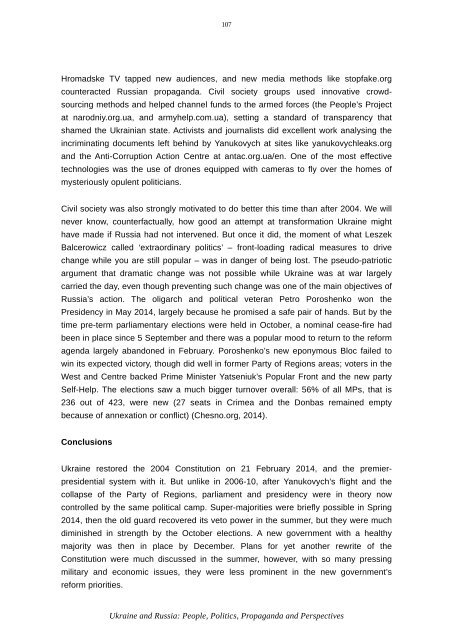Ukraine-and-Russia-E-IR
Ukraine-and-Russia-E-IR
Ukraine-and-Russia-E-IR
Create successful ePaper yourself
Turn your PDF publications into a flip-book with our unique Google optimized e-Paper software.
107<br />
Hromadske TV tapped new audiences, <strong>and</strong> new media methods like stopfake.org<br />
counteracted <strong>Russia</strong>n propag<strong>and</strong>a. Civil society groups used innovative crowdsourcing<br />
methods <strong>and</strong> helped channel funds to the armed forces (the People’s Project<br />
at narodniy.org.ua, <strong>and</strong> armyhelp.com.ua), setting a st<strong>and</strong>ard of transparency that<br />
shamed the Ukrainian state. Activists <strong>and</strong> journalists did excellent work analysing the<br />
incriminating documents left behind by Yanukovych at sites like yanukovychleaks.org<br />
<strong>and</strong> the Anti-Corruption Action Centre at antac.org.ua/en. One of the most effective<br />
technologies was the use of drones equipped with cameras to fly over the homes of<br />
mysteriously opulent politicians.<br />
Civil society was also strongly motivated to do better this time than after 2004. We will<br />
never know, counterfactually, how good an attempt at transformation <strong>Ukraine</strong> might<br />
have made if <strong>Russia</strong> had not intervened. But once it did, the moment of what Leszek<br />
Balcerowicz called ‘extraordinary politics’ – front-loading radical measures to drive<br />
change while you are still popular – was in danger of being lost. The pseudo-patriotic<br />
argument that dramatic change was not possible while <strong>Ukraine</strong> was at war largely<br />
carried the day, even though preventing such change was one of the main objectives of<br />
<strong>Russia</strong>’s action. The oligarch <strong>and</strong> political veteran Petro Poroshenko won the<br />
Presidency in May 2014, largely because he promised a safe pair of h<strong>and</strong>s. But by the<br />
time pre-term parliamentary elections were held in October, a nominal cease-fire had<br />
been in place since 5 September <strong>and</strong> there was a popular mood to return to the reform<br />
agenda largely ab<strong>and</strong>oned in February. Poroshenko’s new eponymous Bloc failed to<br />
win its expected victory, though did well in former Party of Regions areas; voters in the<br />
West <strong>and</strong> Centre backed Prime Minister Yatseniuk’s Popular Front <strong>and</strong> the new party<br />
Self-Help. The elections saw a much bigger turnover overall: 56% of all MPs, that is<br />
236 out of 423, were new (27 seats in Crimea <strong>and</strong> the Donbas remained empty<br />
because of annexation or conflict) (Chesno.org, 2014).<br />
Conclusions<br />
<strong>Ukraine</strong> restored the 2004 Constitution on 21 February 2014, <strong>and</strong> the premierpresidential<br />
system with it. But unlike in 2006-10, after Yanukovych’s flight <strong>and</strong> the<br />
collapse of the Party of Regions, parliament <strong>and</strong> presidency were in theory now<br />
controlled by the same political camp. Super-majorities were briefly possible in Spring<br />
2014, then the old guard recovered its veto power in the summer, but they were much<br />
diminished in strength by the October elections. A new government with a healthy<br />
majority was then in place by December. Plans for yet another rewrite of the<br />
Constitution were much discussed in the summer, however, with so many pressing<br />
military <strong>and</strong> economic issues, they were less prominent in the new government’s<br />
reform priorities.<br />
<strong>Ukraine</strong> <strong>and</strong> <strong>Russia</strong>: People, Politics, Propag<strong>and</strong>a <strong>and</strong> Perspectives


